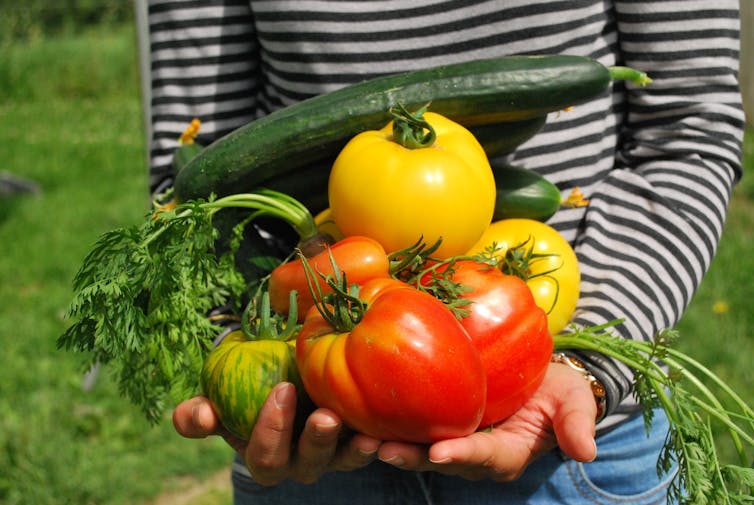[ad_1]
It’s yard season, which suggests gardeners are beginning to take pleasure in their homegrown greens. Nonetheless, for people who reside in cities, metropolis life can reinforce the idea gardens are a bonus, probably a ardour, nonetheless not a necessity of life.
Inside the early days of the COVID-19 pandemic, supermarkets had been saved open as a result of essential factor place they play in feeding us. Nevertheless the Ontario authorities initially shut down neighborhood gardens, ignoring that gardens moreover feed us. The gardens had been solely opened as soon as extra after public pressure.
As public nicely being researchers with a longstanding curiosity in meals strategies and nicely being, we’ve found that, reverse to the considered gardening as a ardour, gardens are essential to life.
We acquired right here to this conclusion based mostly totally on interviews with quite a few gardeners in Toronto, a survey of higher than 100 of us and in depth participant assertion — which on this case meant gardening collectively. Study people included yard gardeners, neighborhood plot gardeners, rooftop gardeners and even of us tending to food-producing crops inside their residence. Our findings are printed inside the peer-reviewed journal, Meals, Custom & Society.
Rising meals inside the metropolis

(Sarah Elton), Creator provided
To develop meals, it is essential to be devoted. There’s the weeding and watering, and dealing with squirrels and raccoons who might get to the meals first.
It’s essential to put cash into seeds and equipment and there could very nicely be a cost paid to city for entry to an allotment plot for many who don’t have home of your particular person. If the yard you generally tend isn’t near the place you reside, you moreover ought to have in mind transportation time. And after all that, the crop might fail.
Although prices are rising, produce is ample in grocery retailers. So to raised understand the place of gardening inside the metropolis, we requested why do of us do it inside the first place?
The commonest response was that gardening was perceived to boost nicely being. One retired worker summed it up correctly:
“In wintertime, it’s important to do further workouts. Nevertheless summertime, if I miss the gymnasium, I don’t actually really feel unhealthy on account of I am doing further.”
Others seen that gardening supported their psychological nicely being. They felt calm with the crops, their ideas alert. In some situations, the gardens gave people a goal to stand up inside the morning at events as soon as that they had been experiencing psychological nicely being points.
To a lot of of us, the crops had been even seen to provide companionship. “I’m dwelling a healthful life resulting from my yard,” said one participant. Gardening contributed to their happiness.
Meals and meals security
One other excuse why of us instructed us they gardened was, not surprisingly, for meals. Most gardeners grew a wide selection of food-producing crops, with 31 per cent of respondents to the survey reporting that they grew as many as 10 to twenty fully differing types.
Importantly, a lot of of the gardeners who provided interviews and who moreover acknowledged as low-income, careworn the importance of gardening to their meals security. One gardener, who has a small plot on church-owned land, instructed us she grew rather a lot meals that she didn’t ought to go to the grocery retailer within the summertime, and that helped alongside together with her family’s funds.

(Pixabay)
One different gardener said he was able to make a significant contribution to his family by producing ample greens on his allotment plot to not solely eat within the summertime nonetheless to freeze for winter. And one woman grew the pure meals she couldn’t afford on the retailer.
People not solely saved this meals for themselves, nonetheless they shared it with household and mates.
Cultural connection
For gardeners who’ve cultural ties to totally different worldwide places, a couple of of whom are newer immigrants, rising their very personal meals is a method to verify entry to the types of greens they grew up consuming.
“We left nonetheless we nonetheless want the fashion,” one man said of why he grows a type of spinach from South Asia. On the retailer, these greens — in the event that they’re on the market — are pricey and aren’t as up to date.
Our findings replicate what totally different researchers have found about the cultural, nicely being and meals security benefits of gardens.
Gardening and concrete nicely being
So if rising meals in gardens inside the metropolis is central to nicely being, meals security and custom, how might policymakers take into accounts gardening in any other case?
We argue that gardens should be thought-about essential components of our meals system. Gardens are essential to the people who’re prone to them — and likewise to the various people whose names are on prepared lists for home to develop meals inside the metropolis, who may not have home of their very personal.
In our survey, people who owned their homes had been further liable to report that they’d been rising meals for higher than 10 years. Homeownership sometimes consists of outdoor home inside the kind of a yard or balcony, which others may not have entry to. The pandemic reminded us what variety of of our eco-social strategies are inequitable and fragile, and totally different researchers have documented how of us turned to gardens proper now.
Diversified ranges of presidency and totally different institutions with jurisdiction over land (akin to those that oversee hydro corridors along with colleges, religious institutions, residence and residence land owners) ought to take movement to broaden secure entry to yard home, notably for people who don’t have a yard.
We should be investing further in publicly accessible gardens as a significant part of our meals system.
[ad_2]